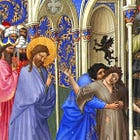Why does rejecting the truth lead to deeper darkness?
Even simply failing to accept the known truth can lead to this same blindness.
Even simply failing to accept the known truth can lead to this same blindness.
Editor’s Notes
In this piece, Fr. Coleridge tells us…
How the blindness of men resists the light of Christ.
That the rejection of Christ’s miracles reveals the deeper rejection of truth.
Why those who demand miraculous signs may be the most blind of all.
He shows us that light is given, but only the pure in heart can see it.
For more context on this episode, its significance and its place in the Roman Liturgy, see here:
Our Lord and his Slanderers
The Preaching of the Cross, Part II
Chapter II
St. Luke xi. 14-36
Story of the Gospels, § 103
Burns and Oates, London, 1887
Headings and some line breaks added.
Sung on the Third Sunday of Lent
Part I: How did Christ turn back the charge of casting out devils by Beelzebub?
Part II: The moment Christ announces his invasion of Satan’s kingdom
Part III: Did Christ rebuke the woman who praised his Mother?
Part IV: Why does Christ refuse to prove himself on demand?
Part V: Why does rejecting the truth lead to deeper darkness?
Light given them
Our Lord had been complaining of the blindness and perversity of the people to whom He was preaching. Some of them had carried their perversity so far as to calumniate Him in the foulest manner, and others had shown an inconceivable blindness in asking for a sign, when His whole teaching was lit up by a series of most splendid and merciful miracles. He had said of these last that there should be no sign given them, except that of Jonas, which has been explained of our Lord’s Resurrection.
Some writers point out that there was a peculiar fitness in the providence by which this particular sign had been determined upon, because Jonas was a preacher of penance, at least penance was the result of his preaching. He had also threatened the destruction of Ninive, if its inhabitants had remained impenitent, and this was to be the case with the Jews, who were to be punished by a destruction of their city and nation.
And again, the almost immediate following of the Resurrection on the great scandal of the Cross was foreshadowed in the history of the prophet. With regard to the calumniators of His teaching and miracles, our Lord had contrasted them most strongly with the Queen of the South and with the men of Ninive. The latter had repented at the mere denunciation of their danger by the prophet, whereas the people of whom our Lord spoke had not only not repented at His preaching, but had invented the most atrocious and inexcusable falsehoods concerning Him, Who was so far greater than Jonas.
The Queen of the South had come from the ends of the earth to listen to the wisdom of Solomon, wise indeed, but only a man, and the Jews would not listen to the Divine Wisdom speaking to them in His own Person, and bringing to their very doors the tidings of salvation, so far greater than anything that Solomon could teach.
Of this extraordinary blindness and perversity our Lord now proceeds to give the reason, beginning with the words on which we are now commenting.
The Father Coleridge Reader is a labour of love. But curating, cleaning up and publishing these texts takes a lot of time—and we like to give a little back to those who support the project with monthly/annual subscriptions.
Please consider joining to keep this project going!



